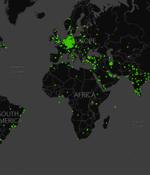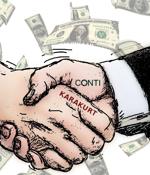Security News

Witschi, the assistant director for cybercrime threat response and operations at Interpol, told The Register about recent successes that the agency's Gateway cyber-threat intel sharing project has had, and the increasingly well-funded, targeted attacks that law enforcement agencies are trying to prevent. Through the project private-sector security shops including Fortinet, Palo Alto Networks, Trend Micro, Kaspersky Lab and others share intelligence with Interpol member countries' law enforcement agencies to help them investigate cybercrime and attribute attacks to the various crime rings.

Microsoft and a consortium of cybersecurity companies took legal and technical steps to disrupt the ZLoader botnet, seizing control of 65 domains that were used to control and communicate with the infected hosts. "ZLoader is made up of computing devices in businesses, hospitals, schools, and homes around the world and is run by a global internet-based organized crime gang operating malware as a service that is designed to steal and extort money," Amy Hogan-Burney, general manager of Microsoft's Digital Crimes Unit, said.

After breaching servers managed by the cybercriminals, security researchers found a connection between Conti ransomware and the recently emerged Karakurt data extortion group, showing that the two gangs are part of the same operation. In a recent report, Infinitum IT details that they were able to gain access to Conti's infrastructure when the Conti leaks started, on February 27, after logging into multiple ProtonMail and Mega storage accounts used by one Conti member.

A coordinated operation conducted by the FBI and its international law enforcement partners has resulted in disrupting business email compromise schemes in several countries. BEC actors are high-level scammers who trick employees of real companies into making payments to bank accounts under their control, pretending to be a business partner or a firm submitting a legitimate payment order.

A Russian national has been indicted by the US DOJ and added to the FBI's Cyber Most Wanted list for allegedly creating and managing a cybercrime marketplace. Igor Dekhtyarchuk, a resident of Russia, was indicted in the Eastern District of Texas for running the cybercrime marketplace that sold credit cards, access to compromised devices or accounts, and personal information.

Microsoft warns of destructive attacks by Lapsus$ cybercrime group. In a blog post published Tuesday, Microsoft provides insight into the group's tactics and techniques and offers tips on how to protect your organization from these attacks.

With not just ransomware gangs raiding network after network, but nation states consciously turning a blind eye to it, today's chief information security officers are caught in a "Perfect storm," says Cybereason CSO Sam Curry. "One of the values that we [CISOs] give an organization is to start thinking about what is that next level? What are they going to pivot to next?".

How can attackers benefit from NFTs and what measures can you take to avoid becoming a victim? Read on to find out. NFTs can be bought or traded on various dedicated marketplaces.

As Russia's invasion of Ukraine rolls through its second week, a United Nations committee has begun hearings on a proposed new cybercrime treaty Russia has been pushing. "Russia has long turned not only a blind eye to cyber criminals operating in its borders, but has openly and actively support it. It's hard to see how Russia could engage in negotiations for a legally-binding cybercrime treaty in good faith. It's harder still to see how it can negotiate at the United Nations for a treaty based on upholding state sovereignty while simultaneously invading a sovereign nation state."

Fortinet's threat intelligence from the second half of 2021 reveals an increase in the automation and speed of attacks demonstrating more advanced persistent cybercrime strategies that are more destructive and unpredictable. New and evolving attack techniques span the entire kill chain but especially in the weaponization phase, showing an evolution to a more advanced persistent cybercrime strategy that is more destructive and unpredictable.